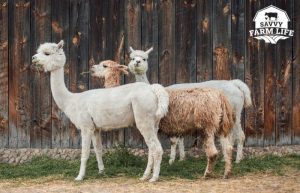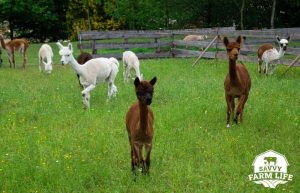
What Sounds Do Alpacas Make And What Do They Mean?
While alpacas are typically a quiet and gentle species, they have their own way of communicating through sound, like most animals. If you plan on getting an alpaca, understanding the vocalizations alpacas make and what they mean can help you know what your alpaca is trying to communicate.
What sounds do alpacas make? Alpacas use some sounds, such as humming, clicking, and groaning, to reflect a variety of emotions and meanings. Some other sounds, such as a gurgling sound and alarm calls, are more specific and easier to decipher.
Certain vocalizations your alpaca makes can mean they are distressed, anxious, injured, excited, or even hungry. Read on to get an in-depth look at the different alpaca vocalizations and what they mean!
Alpaca Vocalizations: Humming
The most common sound you will hear from a herd of alpacas is what is usually referred to as humming. Humming will vary in pitch depending on the individual animal and its purpose for humming. A hum is just that – and can sound like anything from a cat’s gentle purr, to a child- or even baby-like noise. Humming is not considered to be a loud noise, and I personally find the sound quite pleasant.
Why Do Alpacas Hum?
Humming can be a sign of contentedness, a greeting to others, or as a sign of discomfort. When you spend time with your alpacas and get to know their individual personalities and how they work together in their herd, it will be easier for you to decipher the meaning behind your alpaca’s humming.
When Do Alpacas Hum?
While humming can be used in a variety of expressions, there are a few instances where I’ve noticed it is very common to hear this particular sound. For example, when a mother (dam) gives birth to a baby (cria), you will hear almost constant humming coming from her. Dams and crias continue to hum to one another as the cria is being raised. It is also common to hear humming when an alpaca is separated from the herd – this would clearly be humming from discomfort. Herds may also hum if they realize a member of their herd is missing.
Alpacas may also hum when they are happy and to express contentment or peace. They will often hum in greeting, both to members of their herd and to their keepers. Alpacas will also hum when they are bored, curious, apprehensive, and sad (yes, sad – it is common for dams and crias to hum when separated and during weaning).
Alpaca Vocalizations: Clicking
Clicking, also known as “clucking,” is another alpaca sound that can have many interpretations. This is a sound similar to the ones humans make with their tongues to call a pet dog or horse to them. When a human makes this sound, they usually make it with the sides of the tongue against the roof of their mouth – with an alpaca, the sound is more like the sound you would make with the tip of your tongue against the roof of your mouth. We know you are trying this right now!
Why Do Alpacas Make Clicking Sounds?
Clicking is like humming in that it can have many different meanings. Alpacas may click when they are being friendly and submissive, or as a form of intimidation against a herd member or person next to them. Clicking is also used to call for attention from others, and out of concern or discomfort. It is common to hear a dam clicking in concern for her cria, or when separated from her cria (along with humming – dams are quite vocal and expressive).
When Do Alpacas Make Clicking Sounds?
Alpacas will click in greeting, when trying to express bravado to a neighbor, or when showing concern. Alpacas may also click when lonely, bored, or in want of attention.
Alpaca Vocalizations: Grumbling
Alpacas will also grumble in certain situations. This sounds exactly as you would expect it to – like a sound of annoyance not dissimilar to the one a human might make, deep in the throat and clearly used to convey a mild irritation.
When Do Alpacas Make Grumbling Sounds?
An alpaca will often grumble when another has gotten too close for comfort, particularly while grazing, or even if the alpaca is unhappy with being haltered or worked with. This is a mild sound and not quite aggressive – the alpaca will continue to graze as it makes this sound, not bothering to be interrupted, yet wishing to express that a line has been crossed. This is similar to the way a dog may issue a warning growl to another dog that has approached it while eating or playing with a favorite toy.
Alpaca Vocalizations: Snorting
What will an alpaca do when a member of its herd is not respecting its warning grumble? It may issue a snort. An alpaca will stop what it is doing, stand up straight, arch its neck and snort. This snort is used to express irritation and is usually used when another animal is getting too close despite the grumbling warning that the alpaca likely would have issued first.
What Comes After An Alpaca Snorts?
 Another alpaca (or human) is invading the alpaca’s space, ignores the grumble, and does not startle at the snort. Now what? If the warnings of the grumble and snort are ignored, an alpaca will likely resort to spitting. Yes, alpacas spit just like camels and llamas, though they may not resort to it as often. (To learn more, visit my article Do Alpacas Spit? Everything You Need to Know.)
Another alpaca (or human) is invading the alpaca’s space, ignores the grumble, and does not startle at the snort. Now what? If the warnings of the grumble and snort are ignored, an alpaca will likely resort to spitting. Yes, alpacas spit just like camels and llamas, though they may not resort to it as often. (To learn more, visit my article Do Alpacas Spit? Everything You Need to Know.)
If an alpaca’s offender is not backing down, the alpaca will spit – often first with a “dry spit” – which can be considered a warning spit. If the offender is not phased by the dry spit, the alpaca will give them a full green spit. (and humans are not immune to being on the other side of this spit either!) Spitting is the last warning before a fight may occur. A dam may also spit at another alpaca who gets too close to her newborn, or tries to mount her without invitation.
Alpaca Vocalizations: The Alarm Sound
One important sound that the alpaca makes is the alarm call. When an alpaca sees something they perceive as dangerous, the alpaca will issue a loud alarm to the rest of the herd. This is a repetitive sound that is similar to the bray of a donkey, or the screech of a loud hen. When an alpaca sounds this alarm, it alerts the rest of the herd that there may be a danger present, and the rest of the herd will raise their heads and likely bunch together to defend themselves against the threat.
When Is Do Alpacas Make an Alarm Call?
Each alpaca has his or her own level of comfort and what they consider to be dangerous. Some alpacas will sound this alarm when a true threat is discovered – perhaps a coyote or a strange dog. Other alpacas may sound this alarm at a wild turkey, a child that takes them by surprise, or even a grocery bag flying in the wind. You will get to know your individual alpacas and you will become adept at determining whether there is or is not a true threat to the herd when you hear this sound.
Need a complete overview on how to care for alpacas? Visit my article Alpaca Care 101: How To Take Care Of An Alpaca.
Alpaca Vocalizations: Screaming
It is never good to hear screaming from your alpacas. An alpaca will scream when they are in extreme fear or danger. In a well-adjusted and established herd, this often means that they are under attack. It is also not uncommon for a feral or imported alpaca to scream when a keeper attempts to handle it. If you hear your alpaca screaming, you can assume there is a serious threat present.
Alpaca Vocalizations: Gurgling/Orgling
When a male is attempting to garner the attention of a mate, or even during the act of mating itself, he will make an “orgling” sound. This is a loud gurgling sound that can really only be described as its name – an “orgle”.
When a male begins orgling, it can often alert the rest of the (unaltered) males in the herd that it is a good time to mate, which will lead to more orgling. Orgling is a loud sound, and difficult to ignore. It typically does not stop until the mating act has completed.
Other Sounds Your Alpaca Might Make
Outside of these normal alpaca sounds, there are a few additional sounds you may hear from your alpaca herd.
Groaning Alpacas
If you hear your alpaca groaning, he or she may be in pain or experiencing colic. Groaning can also occur in a dam during labor. It is important to investigate any groanings coming from your alpaca to ensure that he or she is healthy.
Sneezing, Coughing, Rattling Alpacas
Alpacas sneeze like humans sneeze, and if a one-off, is no cause for concern. Alpacas may also cough if they have something stuck in their throats, to dislodge a piece of food. While these are not abnormal sounds, frequent sneezing and coughing from your alpacas should be looked into further, and with your vet. In addition, if you can hear your alpaca breathing, particularly if it can be described as rattling, it is important to call your vet. This can indicate a serious infection and should be treated right away.
How Loud Are Alpacas?
In general, alpacas are relatively quiet animals and this is just one of the characteristics that makes them easy keepers. Humming, clicking, and grumbling are quiet sounds and not at all unpleasant. Screaming and orgling are the two loud sounds that alpacas make, and these sounds should not be heard often (or at all, if you have a safe and confident herd of females or altered males).
Vocalizations are just one of the many behaviors alpacas will display to communicate with you. For a more in-depth look at alpaca behavior, visit my article Alpaca Behavior Guide: Alpaca Behaviors And What They Mean.
